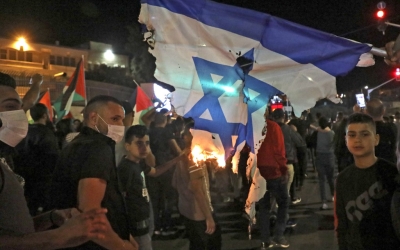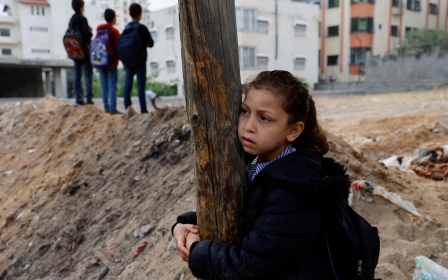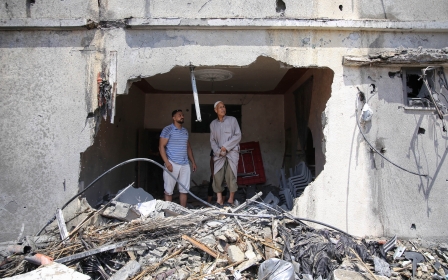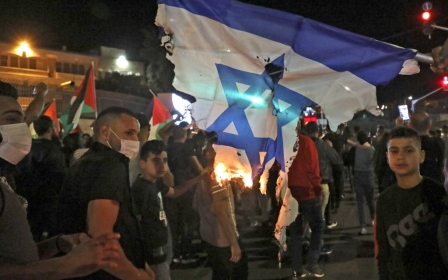Why Israel's violent Gaza strategy to divide Palestinian resistance will fail
In the early morning hours on Tuesday, 9 May, Israeli occupation forces launched a brutal military attack on the Gaza Strip, killing 15 people including three leaders of the Palestinian Islamic Jihad movement (PIJ), four children, and four women.
Israeli forces reported that a total of 40 warplanes participated in the targeted assassination campaign that lasted about two hours.
Israeli outlets also indicated that the military operation may continue for a few days, with Prime Minister Benjamin Netanyahu promising on Wednesday a "broader campaign" and "severe blows against Gaza".
New MEE newsletter: Jerusalem Dispatch
Sign up to get the latest insights and analysis on Israel-Palestine, alongside Turkey Unpacked and other MEE newsletters
Israeli aims
Feelings of despair and anger persist in Gaza, as the population continues to live under the constant threat of bombs. According to Palestinian health officials, the death toll in Gaza has reached 21, with 64 more injured, due to Israel's recent aggression.
Netanyahu believes he can end the judicial crisis by rallying Zionist unity against an external threat
The attacks on Gaza came despite an Egypt-brokered ceasefire agreement last August between Israel and Islamic Jihad, with support from UN special coordinator for the Middle East peace process, Tor Wennesland.
Since Tuesday, there have been some popular demands for response and revenge, while others fear yet another horrific war on the besieged Strip, where civilians remain in the eye of the storm.
Israel's assault on Gaza indicates that Israel does not respect agreements and flouts international law. It appears that Israeli leaders are moving forward with their right-wing and racist agenda which seeks to "resolve" the conflict by force.
By reviving Israel's brutal targeted assassinations policy, Netanyahu seeks to restore the image of deterrence that was cracked due to the resurgence of popular resistance movements in Gaza and the West Bank.
Netanyahu aims to preserve the ruling right-wing coalition, especially after far-right National Security Minister Itamar Ben-Gvir continued to threaten his party's boycott of weekly Israeli cabinet meetings "until he is given 'significant influence' over national security policy".
Knowing this could lead to the government's fracture, including a failure to approve the annual budget and therefore push early elections that could lead to his toppling, Netanyahu, whose popularity has declined significantly in favour of Benny Gantz and his National Unity party, has chosen to shift the focus to Gaza.
Netanyahu's latest assault on Gaza is a well-worn strategy among Israeli politicians to manufacture unity during times of internal strife. After months of mass protests against the ruling coalition's plans to overthrow the judiciary, Netanyahu believes he can end the judicial crisis - now in its 18th week - or at least halt the protests by rallying Zionist unity against an external threat.
Failure to subdue
The joint operations room for the resistance movements in Gaza announced that the groups are united and ready to respond to Israel's attacks. This indicates a failure to undermine Palestinian resistance, which Israel attempted to fracture by targeting only Islamic Jihad commanders.
Israeli forces threatened to carry out targeted assassinations against Hamas leaders if they were to participate in any military response to Israeli aggression.
The occupation state is anxious about Palestinian unity and has built its policy on mechanisms of fragmentation and division. It has managed to do so geographically by separating the Gaza Strip from the West Bank and dividing the latter into enclaves and Bantustans.
It is now trying to separate the resistance forces from each other.
The resistance groups understand that the conflict with Israel and its settler-colonial project is historical and existential and that all Palestinian political factions are within Israel's target circle. Therefore, I believe that the policy of division and fragmentation will fail.
It should be noted here that the escalation by the government of the new fascists - Netanyahu, Ben-Gvir, and Minister of Finance Bezalel Smotrich - is not limited to the Gaza Strip but extends to the West Bank, Jerusalem, 1948 Palestinians, and our political prisoners.
The occupation government is under the illusion that its policy will break the will and steadfastness of our people and their determination to resist and struggle.
If the fascist right-wing government poses a threat to our people, it is important to turn this threat into an opportunity by working towards achieving a unified struggle in the field.
Examples include pursuing action against Israeli war criminals in international courts, promoting popular resistance and diplomacy, exposing the fascist and racist nature of the occupying state, and revealing the deep connection between Zionism, fascism, and racism.
Palestinians across the occupied territories continue to emphasise national unity on the basis of resistance and struggle
Palestinians are waiting to see what will happen in the coming hours, though the situation seems to be moving towards escalation.
Despite the fear of another war on Gaza, Palestinians across the occupied territories continue to emphasise national unity on the basis of resistance and struggle, including the importance of practising all forms of legitimate struggle to defend the freedom and dignity of our people.
That Israel would engage in yet another brutal campaign against Gaza on the 75th anniversary of the Nakba only confirms the nature of the Zionist colonial project as an aggressive and racist system built on violence and ethnic cleansing.
The views expressed in this article belong to the author and do not necessarily reflect the editorial policy of Middle East Eye.
Middle East Eye delivers independent and unrivalled coverage and analysis of the Middle East, North Africa and beyond. To learn more about republishing this content and the associated fees, please fill out this form. More about MEE can be found here.






